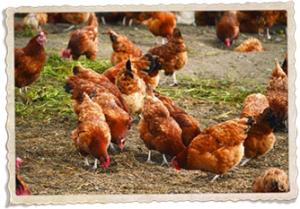 There are a great many tasks you’re responsible for when you choose to invest in backyard chickens. One that is often overlooked is keeping them safe from predators. Even in suburban settings, there are predators that can bring harm to your beloved backyard poultry.
There are a great many tasks you’re responsible for when you choose to invest in backyard chickens. One that is often overlooked is keeping them safe from predators. Even in suburban settings, there are predators that can bring harm to your beloved backyard poultry.
With that in mind, it’s important to walk through some simple, yet effective tips to keep those pesky predators at bay:
Strengthen Your Coop Defenses
Predators, such as raccoons, are surprisingly skilled with their paws and can open simple latches or exploit weak spots in a coop. Hardware cloth is a strong wire mesh that is more durable than traditional chicken wire and can withstand the probing paws of raccoons and the sharp teeth of rodents. Cover all windows, vents, and openings with this cloth to prevent any breaches. Additionally, make sure that the coop itself is sturdy – predators can’t invade what they can’t penetrate. Ensure the coop floor is solid and consider laying wire mesh beneath the soil to deter digging predators like foxes and weasels.
Implement Robust Fencing
Your chicken’s outdoor run needs to be encased in fencing that serves as a formidable barrier against intruders. For aerial predators such as hawks and owls, overhead netting or wire is a must. On the ground level, bury your fence at least 12 inches deep to discourage digging predators. Bending the bottom outward in an “L” shape can provide additional security. Electric fencing can also be a significant deterrent; just a zap can teach predators to keep their distance. However, make sure to follow all safety guidelines to keep both your chickens and human family members safe.
Employ Guardian Animals
A good guardian animal will not only protect your chickens but also become a part of your family. Dogs must be trained to understand that chickens are friends, not food. Livestock guardian breeds, such as Maremma Sheepdogs, have instincts that make them naturally protective of their flock. Donkeys and llamas, on the other hand, don’t often bond with the chickens but they a natural aversion to canines and will fiercely protect their territory against any perceived threats, which includes common predators like coyotes and stray dogs.
Eliminate Enticements
An often-overlooked aspect of predator control is removing temptations. This means keeping your coop free of food waste that might attract rodents, which in turn attract larger predators. Secure your feed in metal containers with locking lids. Clear away any spilled feed each evening and collect eggs regularly so they don’t lure in wildlife. Also, make sure your compost pile, if you have one, is not easily accessible as it can be another food source for critters.
Deter with Light and Sound
Most predators are nocturnal and prefer to hunt under the cover of darkness. Installing motion-sensor lighting around your coop can be an effective deterrent, spooking predators as they approach. Unexpected noises can also scare off potential threats. A radio set to a talk station can mimic human activity and is often enough to deter wildlife. Even a few strategically placed wind chimes can create an environment of unpredictability that can make predators think twice.
Raising chickens is a commitment that goes beyond providing food and water; it’s about creating a safe habitat for them to thrive.
When you’re looking to start or expand your flock, the health and vitality of your chickens are just as crucial as the security of their environment. That’s where Chickens for Backyards comes into the picture. With a wide selection of hearty breeds, we offer quality poultry that can stand strong against the challenges of the outdoors. Choose a supplier who values the well-being of our birds as much as you do! Contact us today if you have any questions!

